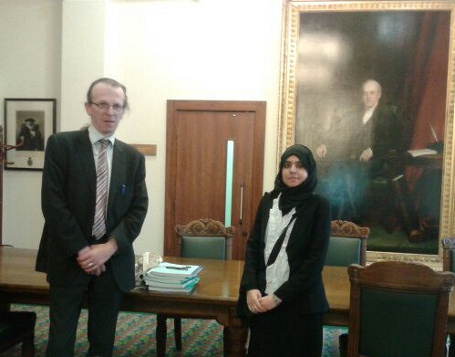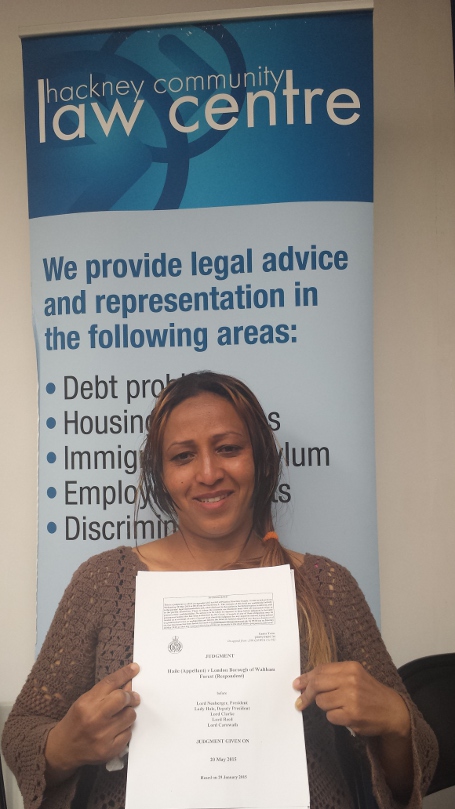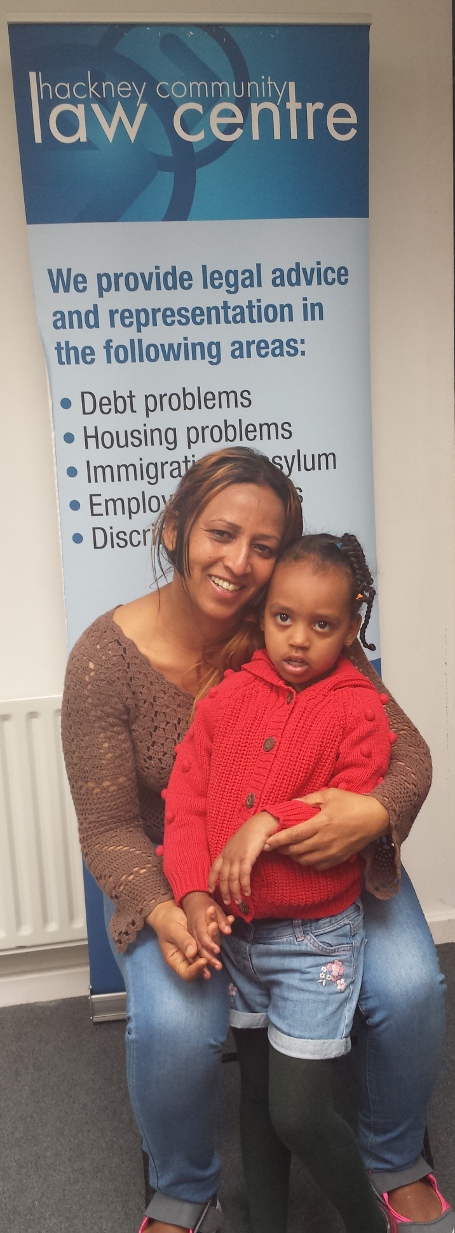HCLC wins landmark case in the UK Supreme Court!
20/5/2015
We are absolutely delighted to report that on Wednesday 20th of May 2015, the United Kingdom Supreme Court allowed an appeal, lodged by HCLC on behalf of our client Ms Saba Haile, which sought to challenge the way local authorities have been interpreting the definition of 'intentional' homelessness.
Prior to the case of Haile v the London Borough of Waltham Forest (Haile) brought by HCLC on Ms Haile's behalf, the leading case on intentional homelessness was Din v Wandsworth London Borough Council [1983] 1 AC 657 (Din).
Thanks to Ms Haile, however, the Haile UK Supreme Court judgment, while not overruling the case of Din, marks a significant departure from the way the law on intentional homelessness has been defined for the last 20 years. Haile v the London Borough of Waltham Forest establishes a new legal test for intentional homelessness to which every UK local authority will now have to adhere.
BACKGROUND TO THE CASE Ms Haile was a young homeless woman who began residing in a private rented hostel in the London Borough of Waltham Forest in June 2010. It was a hostel for single people. No children or dependants were allowed. The hostel was smelly and unpleasant with the kitchen and toilets being used by 15 people. Ms Haile was so grateful to have a roof over her head that she did not complain. The situation changed for Ms Haile in May 2011, however, when she became pregnant with her first child.
Though she tried to continue coping up with her living conditions, the smells, the oppressive atmosphere and the serious anti social behaviour of another resident, exacerbated Ms Haile's morning sickness to such a degree that she was constantly vomiting and feared that she might lose her unborn baby.
In late October 2011, Ms Haile could cope no more and left the hostel. She began sofa surfing. Ms Haile then tried to make a homelessness application to LBWF in early November 2011 and approached HCLC for assistance. In late November 2011, LBWF decided that as Ms Haile had left the hostel voluntarily and stated that she had made herself intentionally homeless. They informed HCLC that they would therefore not be providing Ms Haile with any further accommodation. This was despite the fact that LBWF acknowledged that the hostel's single person policy meant that Ms Haile would most certainly have been evicted from the hostel - and thus become involuntarily homeless - as soon as her baby was born four months later.
HCLC helped Ms Haile to lodge an application requesting an official review of LBWF's decision but this too was negative. HCLC then issued proceedings on Ms Haile's behalf in the County Court, instructing Kerry Bretherton of Tanfield Chambers. The court hearing took place in October 2013 but the appeal was dismissed. HCLC then applied for permission to appeal to the Court of Appeal, which was granted, and the case was heard at the Court of Appeal by the Lord Justices Jackson, Fulford and Clarke in June 2014.
They too dismissed Ms Haile's appeal. HCLC then decided to lodge an appeal at the Supreme Court as we believed that it was essential that Ms Haile's case was heard at the highest level. We felt strongly that Ms Haile's case involved a point of law of general public importance regarding the definition of intentional homelessness. MS HAILE'S SUPREME COURT APPEAL Ms Haile's appeal at the UK Supreme Court took place on the 29th of January 2015. It was heard by a panel of five Supreme Court judges including the President Lord Neuberger and the Deputy President Lady Hale.
HCLC again instructed Kerry Bretheron of Tanfield Chambers who was supported at the appeal by Laura Tweedy of Hardwicke Chambers. After reserving their judgment following submissions on the 29th of January 2015, their Lordships allowed the appeal on the 20th of May 2015! Giving the lead judgment, Lord Reed concluded that even though Ms Haile had voluntarily left the hostel in October 2011, LBWF had given no consideration as to whether her homelessness might actually have been caused by her certain eviction - once her baby was born - from a hostel that only permitted single people without children.
As Lord Reed stated at paragraph 67 of the judgment, "The birth of the baby meant that the appellant would be homeless, at the time when her case was considered, whether or not she had left the hostel when and for the reasons she did". Their Lordships therefore held that Ms Haile had not made herself intentionally homeless.
Commenting on her Supreme Court victory, HCLC client Saba Haile (pictured right with her solicitor Tayyabah Ahmed) said: "I am so emotional. I could almost faint. I can't express how I'm feeling. I'm overjoyed. It's been 4 years. I felt like I didn't have my rights. I was living in terrible living conditions. Hackney Community Law Centre have done an amazing job. When we were appealing to the Supreme Court, I told Tayyabah to forget it. I was exhausted but Tayyabah said we had to keep going and that we couldn't give up. I would like to thank Tayyabah and everyone at HCLC for winning my case. HCLC have supported me for the whole 3 years from start to finish. Now I can plan a real future for me and my daughter".
Ms Haile's solicitor Tayyabah Ahmed (pictured in the Supreme Court) said: "This is a fantastic result for applicants as well as a practical and necessary guideline for local authorities. I am really pleased that HCLC was able to advance our argument all the way to the UK Supreme Court".
HCLC Senior Housing Solicitor Nathaniel Mathews (pictured in the Supreme Court) added: "This judgment is of particular relevance to those living in hostels with a 'no children' policy. It further emphasises the strong legal protections that exist for pregnant women threatened with homelessness". Ms Haile's barrister Kerry Bretherton said: “the clarity which has been achieved by Lord Reed’s analysis of 'Din' is welcomed by all who practice in this area. The decision will, inevitably impact on all cases of intentional homelessness and lead to a duty being ow ed to many who would have otherwise been homeless and may require further applications by those who have been found to be intentionally homeless.”
ed to many who would have otherwise been homeless and may require further applications by those who have been found to be intentionally homeless.”
*READ A FULL STATEMENT FROM TAYYABAH AHMED & KERRY BRETHERTON ON THE LEGAL IMPLICATIONS OF THE CASE HERE*. *READ THE FULL 'HAILE V WALTHAM FOREST' SUPREME COURT JUDGMENT HERE*.
HCLC is grateful to everyone who supported Ms Haile's case, particularly our instructed barristers Kerry Bretherton and Laura Tweedy. We are very proud that our small, under-resourced legal charity has yet again been able to play a major role in changing the law.














CONNECT